Israel
Our shared planet is crumbling under the weight of human greed and exploitation; our neighbors are being snatched up and disappeared from our communities; and money for jobs and education is being used to fund wars and genocide. And I’m expected to believe that God is good?
With a fragile ceasefire between Israel and Hamas in place, it is tempting for many in the West to ignore the broader issues that Palestinians still face: Namely, increased settler violence and the state of Israel annexing more Palestinian land. I went to Palestine in August, while the war that was not a war still raged, and I saw firsthand the dire reality of Palestinians in the West Bank.
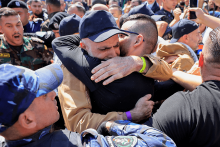
Joyous Palestinians rushed to embrace prisoners freed under a U.S.-brokered ceasefire agreement as they arrived by bus to the occupied West Bank and Gaza on Monday.
The prisoners were released after the Hamas militant group freed the last 20 living hostages taken during the Oct. 7, 2023, attacks that precipitated the war in Gaza.
Under the deal, Israel is set to release 250 Palestinians convicted of murder and other serious crimes as well as 1,700 Palestinians detained in Gaza since the war began, 22 Palestinian minors, and the bodies of 360 militants.
Several thousand people gathered inside and around the Nasser Hospital in Khan Younis in the southern Gaza Strip, awaiting the arrival of freed prisoners, with some waving Palestinian flags and others holding pictures of their relatives.
Fighting back tears, one woman who asked to be identified as Um Ahmed said she said that despite her joy at the release, she still had “mixed feelings” about the day.

For as long as Lecrae has been a public figure, he has been a lightning rod for white evangelical racism.
A spearhead for the movement that turned Christian hip-hop from a misfit genre to a powerhouse industry, Lecrae has consistently endured racism thinly veiled as theological critique. While he was earning deep respect from hip-hop luminaries—Sway In the Morning and Kendrick Lamar, for example—he was fighting a Christian industry that only begrudgingly came to accept that CHH was here to stay.
Early on, critics claimed “Christian” and “hip-hop” were contradictory terms, and Christian rappers like Lecrae were putting godly messages second to godless culture. Then, as the U.S. began another reckoning with racist police violence, Lecrae was accused of division, partisanship, and putting “political issues” like racism before “biblical issues” like abortion. When he attempted dialogue, white pastors told him to his face that chattel slavery was a “white blessing.”

Last weekend, I visited my home state of Illinois to attend the Church at the Crossroads conference, which was held at Parkview Community Church in Glen Ellyn. Conference organizers estimated that 580 attended in person and 300 more joined virtually. The conference was convened to encourage American evangelicals to listen to Palestinian Christians and to confront and correct those who use scripture to “justify war, occupation, or silence” in the face of the escalating violence in Israel and Palestine.
Practically speaking, though, what was the point of this shindig?

In 2002, director Danny Boyle and screenwriter Alex Garland released a post-apocalyptic horror movie that would redefine the zombie genre forever. 28 Days Later was not only ambitious for its experimental cinematography and reliance on relatively obscure actors, but also because of its critical commentary on violence and militarism. Boyle and Garland have partnered up again for the newest installment in the 28 Days Later film series, with the release 28 Years Later (now playing in theaters).
There’s nothing wrong with a gross and scary zombie movie that just stops there, but the 28 Days Later film series offers more than jump scares and blood-barfing, fast-moving zombies, which are called “infected” in the films.
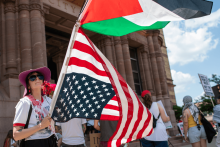
We also need to be clear: Iran did not possess a nuclear weapon. Iran was enriching uranium needed for such a weapon and had recently increased its production, but intelligence assessments concluded they had not made a final decision to produce a bomb. In fact, the assessment said Iran would be more likely to produce a weapon if the U.S. attacked its uranium supply.
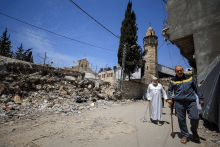
Francis called the church hours after the war in Gaza began in October 2023, Antone said, the start of what the Vatican News Service would describe as a nightly routine throughout the war. He would make sure to speak not only to the priest but to everyone else in the room, Antone said.
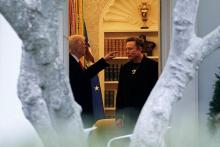
Since arriving to the White House, the richest man in the world, Elon Musk, has been on a destructive whirlwind through the federal government. At the behest of President Trump, the South African billionaire and chief of the Department of Government Efficiency has led an effort to illegally gut numerous federal agencies, fire tens of thousands of federal workers, and perpetrate fraud while claiming to root it out.
Regarding the seemingly intentional turmoil of Musk’s actions, Trump bragged at the Conservative Political Action Conference that his administration had “effectively ended the left-wing scam known as USAID. The agency’s name has been removed from its former building, and that space will now house agents from Customs and Border Patrol.” Taken alone, these actions have the makings of an oligarchic heist or a coup that cripples the government’s capacity to provide and protect public goods.
But within a wider aperture of the administration’s priorities — ripping apart families, hoping to establish concentration camps, offering refugee status to white Afrikaners, attacking trans people, and engaging in a “war on woke” across institutions — a coherence comes into focus amid the chaos. These are men who destroy to build a racial hierarchy in service of their own wealth and profit. Or as political commentator Elie Mystal of The Nation has framed it, they are bringing a “a neo-apartheid economic agenda to the US government.”
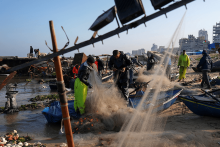
Amid the fragile ceasefire, the exchange of hostages, and the temporary pause in Israel’s genocidal onslaught against Gazans, nearly six hundred Christians huddle together in one of Gaza’s battered churches, their prayers rising above the rubble as a defiant testament to their faith and resilience. Among them, Gazan Christian George Antone boldly declares, “For us, as Christians, we are not leaving Gaza. We will remain in Gaza and help people in Gaza reconstruct their houses, rebuild the streets. Yes, we will stay in Gaza. We are not leaving.”
Antone’s words stand in stark contrast to the explosive press conference at the White House on Feb. 4, when President Donald Trump brazenly suggested that the United States should “effectively own” Gaza, proposing to turn it into a real estate venture while displacing Palestinians from their homeland and relocating them to neighboring countries.

When I visited Rev. Munther Isaac in Bethlehem, the West Bank, in October, he mentioned that he was previously opposed to liberation theologian James H. Cone. Isaac was trained in theologically conservative teachings, growing up in a conservative church and then leaving Palestine to attend a conservative seminary in the U.S.
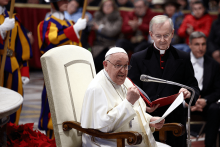
An Israeli government minister criticized Pope Francis on Friday for suggesting the international community should study whether Israel’s military offensive in Gaza constitutes a genocide of the Palestinian people.

An evangelical Christian, Huckabee has been a vocal supporter of Israel throughout his political career and a longtime defender of Jewish settlements in the occupied West Bank. A former Republican presidential hopeful, Huckabee hosted a weekly Fox News TV show for six years ending in 2015.

Ruth Padilla DeBorst told her audience: “There is no room for indifference toward all who are suffering the scourge of war and violence the world round, the uprooted and beleaguered people of Gaza, the hostages held by both Israel and Hamas and their families, the threatened Palestinians in their own territories, all who are mourning the loss of loved ones.”
Less than 48 hours later, the director of the Fourth Lausanne Congress emailed all attendees, issuing a lengthy apology for Padilla DeBorst’s speech.
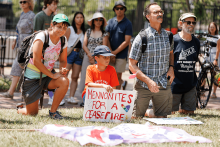
Starting on Thursday, July 18, between 35 and 125 Mennonites and interfaith allies from the U.S. and Canada made steady progress on their 11-day, 141-mile “All God’s Children March for a Ceasefire” trek from Harrisonburg, Va., to Washington, D.C. Upon arrival in Washington on Sunday, July 28, the marchers urged Congress and President Joe Biden’s administration to support an immediate, permanent ceasefire, the release of all hostages and political prisoners, an end to military aid to Israel, and a political solution that ends the occupation of Palestine, ensuring peace for Palestinians and Israelis. And on Tuesday, July 30, 46 of the people were arrested by Capitol Police during a protest.

In the quiet oratory of Holy Wisdom Monastery in Middleton, Wisc., I spent my mornings gazing at the face of Jesus. On the far wall of the room where we prayed hung an icon of Jesus holding a tablet that read, “Behold, I make all things new.” Outside the prairie was a technicolor parade of coneflowers, whorled milkweed, and purple loosestrife, while robins, cardinals, and song sparrows continued their song; but it was hard for me to believe that Christ was making things new in the present.
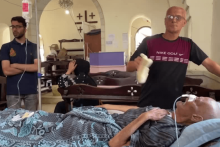
The Episcopal Church of Jerusalem and the Middle East protested the closure of Al-Ahli Arab Anglican Hospital in Gaza City as a result of the evacuation of several residential districts ordered by the Israeli military.
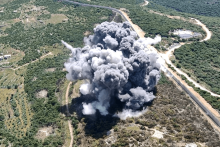
A group of us stood on a hill overlooking northern Gaza this spring, not far from the border fence. We were close enough to see the buildings of Beit Hanoun and Jabalia. After a few minutes of description by our guide, we surveyed the scene with binoculars. On closer inspection, what had appeared to be buildings turned out to be rows of rubble. While for months we have viewed such images on screens, actually seeing the destruction, through plumes of smoke and dust, was surreal.

Early in his adult life, Lau-Lavie is outed in a news article as gay, prompting him to move from Israel to New York in search of a spiritual life that makes more sense than his Orthodox heritage.
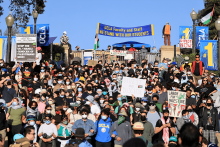
Since Oct. 7, 2023, when Hamas launched a terror attack against Israel, young people across the country have looked with alarm at Israel’s military action and the U.S. support for it.
“As soon as that day happened, I felt I was just kind of flung into high gear,” said Logan Crews, who is a first year Master of Divinity student at Yale University. “I began talking to friends right away and just processing through what was happening.”